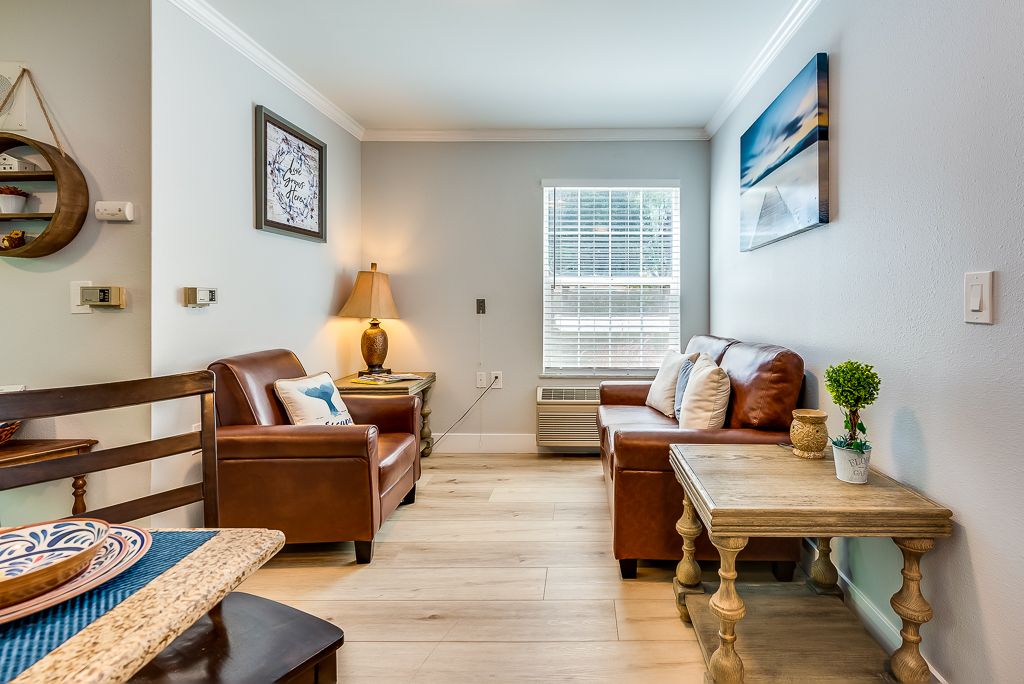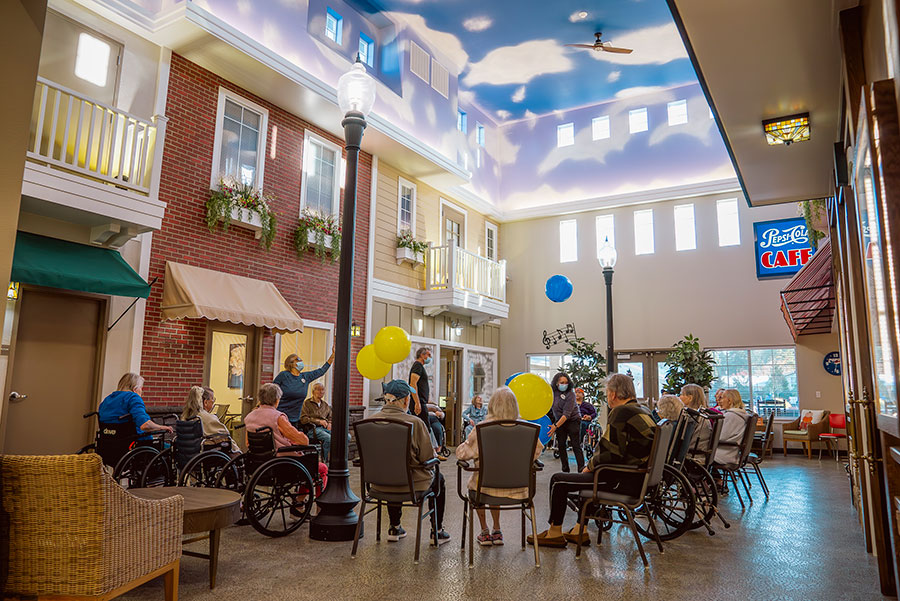How Boutique Memory Care Enhances Daily Living for Aging Loved Ones
How Boutique Memory Care Enhances Daily Living for Aging Loved Ones
Blog Article
Exploring the Value of Memory Treatment Provider in Small Memory Care Residences
Memory care services play a necessary function in boosting the lives of people with cognitive disabilities. In small memory care homes, the focus changes to customized care customized to each citizen's distinct demands. These intimate settings cultivate much deeper connections and a supportive community. However, the question continues to be: exactly how do these atmospheres especially add to the psychological well-being of both homeowners and their families? Understanding this dynamic reveals truth worth of specialized memory care.
Understanding Memory Care and Its Importance
Memory treatment is a crucial element in attending to the unique needs of people with cognitive problems, such as mental deterioration and Alzheimer's illness. This specialized kind of care concentrates on producing a helpful and secure atmosphere customized to the challenges dealt with by these individuals. Memory treatment centers utilize trained staff that understand the intricacies of cognitive decline, supplying customized treatment that advertises self-respect and respect.Activities and routines are created to promote memory retention and cognitive feature while making certain security and protection. Additionally, memory treatment stresses social interaction, which can reduce sensations of isolation and enhance emotional health. By fostering a structured environment, people can browse their day-to-days live with more confidence. Comprehending the importance of memory care exposes its function in boosting quality of life, enabling individuals to maintain as much freedom as possible while getting the support they need.

The Benefits of Smaller Sized Memory Care Homes
Smaller sized memory care homes use an even more intimate setting that can markedly enhance the high quality of take care of residents. With less residents, staff members can develop stronger relationships, promoting trust fund and psychological links. This individualized attention typically brings about improved communication, making it simpler for caretakers to comprehend and fulfill the distinct requirements of each citizen. On top of that, smaller sized environments generally minimize stressors and disturbances, promoting a relaxing ambience helpful to memory retention and emotional wellness. The layout of smaller sized homes commonly encourages socializing among locals, permitting purposeful interactions that can fight feelings of isolation. Additionally, these homes can adapt more swiftly to changes in treatment demands, making sure that homeowners receive timely support. On the whole, the customized interest, minimized stress and anxiety, and improved social opportunities located in smaller sized memory care homes create a caring setting that supports both cognitive function and psychological health and wellness
Personalized Treatment Program for Individual Needs
Customized treatment plans are important in addressing the unique requirements of people in memory care. These plans typically include tailored support methods that enhance daily living and promote wellness. Additionally, individualized task involvement assists locals attach with their rate of interests, promoting a feeling of purpose and happiness.
Tailored Assistance Techniques
When creating tailored assistance strategies in memory care services, recognizing the unique demands of each person is basic. These techniques include developing personalized care plans that deal with the particular requirements, preferences, and capabilities of homeowners. By evaluating cognitive function, emotional well-being, and physical wellness, caregivers can create effective treatments that promote convenience and freedom - small memory carehomes Charlotte. This personalized technique warranties that each homeowner obtains ideal assistance, enhancing their lifestyle. Regular analyses and adjustments to these plans are vital, as they allow caregivers to respond proactively to changing demands. Furthermore, engaging family members in the planning process cultivates a collective environment, enhancing the support network for people with memory challenges. Eventually, customized support approaches are essential for providing efficient and caring memory care
Embellished Activity Interaction
Developing purposeful interaction via personalized tasks is necessary in memory care solutions. Memory care homes focus on personalized care strategies that accommodate the unique requirements and preferences of each local. These plans usually consist of tasks tailored to locals' passions, capabilities, and cognitive degrees, boosting their sense of objective and self-respect. By integrating familiar regimens, leisure activities, and social interactions, caretakers can promote cognitive function and emotional wellness. Individualized task involvement not only cultivates a supportive setting but also motivates citizens to keep their freedom. The active participation in these customized tasks can lead to boosted mood and minimized anxiousness, enhancing the value of a holistic technique in memory treatment that recognizes each individual's trip and distinct experiences.
Developing an Encouraging Community Environment
While fostering Check This Out a supportive area atmosphere is vital for those with memory treatment needs, it needs intentional style and thoughtful interaction. Creating such an atmosphere entails a mix of physical area and interpersonal links. Tiny memory treatment homes can profit considerably from layouts that encourage social interaction, such as open typical locations and relaxing celebration rooms. These styles promote a sense of belonging and safety and security for residents.Moreover, team member play a crucial function in cultivating this environment. Educating caretakers to prioritize empathy and active listening promotes and improves partnerships count on. On top of that, involving family members in treatment strategies and neighborhood activities can enhance bonds and create a network of support.
Enhancing Social Engagement and Tasks
Efficient social involvement and tasks are crucial for enhancing the wellness of citizens in memory care homes. These interactions not only foster a feeling of belonging but additionally promote cognitive features, which can favorably affect memory retention. Tiny memory care homes usually supply customized programs customized to the one-of-a-kind rate of interests and capabilities of each homeowner, permitting even more meaningful and effective engagement.Activities such as art therapy, music sessions, and team video games encourage locals to link with each other, advertising relationships and decreasing feelings of seclusion. In addition, including outside tasks, such as horticulture or nature walks, can enhance mood and overall health.These improving experiences assist locals keep a sense of objective and pleasure in their lives. By producing an environment that focuses on social interaction, tiny memory care homes considerably contribute to the mental and psychological health of their homeowners, ensuring they really feel valued and supported in their trip.
Supporting Families Through the Journey
As family members navigate the challenges of taking care of a liked one with memory problems, the assistance given by little memory care homes ends up being necessary. small memory carehomes Charlotte. These homes supply not just specific look after locals yet also beneficial resources for families. By cultivating a collaborative atmosphere, small memory care homes urge open interaction, allowing families to reveal problems and share experiences.Support teams and educational workshops are often offered, outfitting families with understanding and approaches to handle the intricacies of amnesia. Such efforts help reduce feelings of isolation, as family members connect with others encountering similar situations.Moreover, tiny memory treatment homes usually give customized updates on residents' well-being, relieving families' concerns and aiding them feel associated with their loved one's daily life. This all natural strategy to sustain not just enhances the quality of look after residents yet additionally empowers households throughout their emotional trip
The Impact of Specialized Personnel Training on Treatment High Quality
In tiny memory treatment homes, the high quality of treatment is exceptionally influenced by the training and experience of the staff. Specialized training outfits caregivers with essential abilities to comprehend and deal with the distinct requirements of homeowners with memory problems. Understanding of dementia-related actions, efficient communication methods, and person-centered treatment strategies boosts the capability of personnel to produce an encouraging environment.Moreover, experienced staff are better prepared to take care you could try these out of tough situations, decreasing the possibility of problems and guaranteeing a calmer environment. This training fosters a much deeper psychological connection between caregivers and residents, promoting trust and improving total wellness. Furthermore, specialized training can result in higher work complete satisfaction among caretakers, lowering turnover rates and offering continuity of take care of homeowners. Ultimately, the investment in personnel education and learning significantly boosts the standard of treatment, which is essential for boosting the lifestyle for people in small memory treatment homes.

Often Asked Inquiries
How Do I Choose the Right Memory Treatment Home for My Enjoyed One?
Selecting the right memory treatment home involves reviewing personal needs, visiting centers, assessing team experience, understanding treatment alternatives, taking into consideration area, comparing prices, and looking for suggestions. Each factor plays an essential function in making sure suitable care.
What Is the Expense Distinction In Between Little and Large Memory Treatment Facilities?
The cost distinction between look at this website little and big memory care centers can differ substantially. Normally, small homes may offer more individualized treatment at a higher per-person price, while bigger centers commonly give a lot more amenities at a reduced overall price.
Exactly How Often Can Households Check Out Their Enjoyed Ones in Memory Care Residences?
Families can usually visit their enjoyed ones in memory care homes as often as preferred, with numerous centers motivating regular check outs to keep connections and assistance psychological well-being, though details policies might vary by home.
What Details Activities Are Used in Small Memory Care Homes?
Little memory care homes normally provide activities like crafts and arts, songs therapy, gardening, workout courses, and cognitive video games. These tasks are made to engage locals, stimulate their minds, and promote social communication amongst them.
Exist Any Type Of Age Limitations for Citizens in Memory Treatment Facilities?
Age limitations for residents in memory care facilities normally differ by location and private center policies. Generally, these homes satisfy older adults, frequently calling for residents to be at least 55 or 60 years old. In small memory care homes, the focus changes to personalized care customized to each local's unique needs. Memory care facilities utilize trained team that recognize the intricacies of cognitive decline, offering individualized treatment that promotes self-respect and regimens and respect.activities are designed to boost memory retention and cognitive feature while making certain security and protection. Smaller memory treatment homes offer a more intimate setting that can markedly improve the high quality of treatment for locals. Memory care homes prioritize individualized care strategies that cater to the distinct requirements and preferences of each resident. As families browse the difficulties of caring for a liked one with memory problems, the support given by tiny memory treatment homes comes to be important.
Report this page